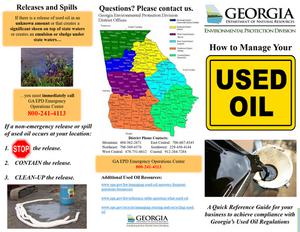Releases and Spills
If there is a release of used oil in an unknown amount or that creates a significant sheen on top of state waters or creates an emulsion or sludge under
state waters...
Questions? Please contact us.
How to Manage Your
...you must immediately call GA EPD Emergency Operations Center
800-241-4113
If a non-emergency release or spill of used oil occurs at your location:
1.
the release.
2. CONTAIN the release.
3. CLEAN-UP the release.
District Phone Contacts: Mountain: 404-362-2671 East Central: 706-667-4343 Northeast: 706-369-6376 Southwest: 229-430-4144 West Central: 478-751-6612 Coastal: 912-264-7284
GA EPD Emergency Operations Center 800-241-4113
Additional Used Oil Resources:
www.epa.gov/hw/managing-used-oil-answers-frequentquestions-businesses
www.epa.gov/hw/reference-table-question-what-used-oil
www.epa.gov/recycle/managing-reusing-and-recycling-usedoil
A Quick Reference Guide for your business to achieve compliance with
Georgia's Used Oil Regulations
Why do I have to manage How do I manage used oil?
my used oil?
Used oil is regulated by federal and state environmental laws in order to protect human
Used oil in any amount can be stored on site for any length of time. However, the used oil must:
health and the environment. If you choose to manage your used oil as described as follows (which prepares your used oil to be recycled), then you will be taking advantage of the less strict regulations for used oil management. If you choose not to manage your used oil as described,
Be kept in a container labeled "Used Oil" (NOT "waste oil"* Be in a container that is in good condition with no leaks Be in a closed container if it is kept outside
then your used oil would be considered waste oil* and you may have to handle it as hazardous waste.
Proper Used Oil Storage
Used oil and hazardous waste laws and regulations
can be found at https://epd.georgia.gov/existing-
rules-and-corresponding-laws
If you are changing the oil in your personal vehicle or otherwise managing used oil generated from your personal use, then you are a household "do-it-yourselfer" and are NOT required to manage your used oil as described here but we recommend it as a best practice!
Improper Used Oil Storage
What is used oil?
Used Oil is any petroleum-based or
synthetic oil that has been used, including: used
engine oil, used transmission fluid, used
refrigeration and compressor oils and used
electrical insulating oils. Used oil is NOT antifreeze, kerosene, vegetable or animal oil, or
petroleum-based solvents.
Used engine oil
Antifreeze
How do I get rid of used oil?
You should make arrangements with a used oil processor to pick up your used oil via a used oil transporter. Per state and federal law, used oil transporters and processors must have an EPA ID#.
How do I manage used oil filters?
Non-terne used oil filters should be hot drained into a properly labeled container for at least 12 hours. Once the oil filter is properly drained, the filter can be disposed of as a solid waste along with the other regular trash in your solid waste dumpster. If you choose not to hot drain the filters, then the filters should be managed as used oil.
Draining oil filters
Used oil drained from filters
Properly drained oil filters
Used transmission oil Used vegetable oil
It is your responsibility as a used oil generator to make sure you contract with a transporter with an EPA ID# to pick up your used oil for recycling.
